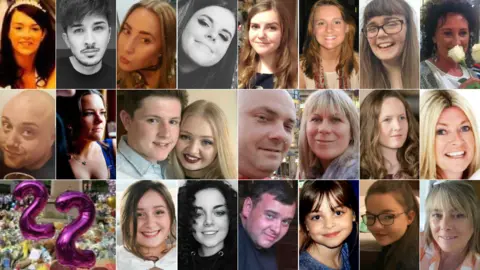Manchester Arena Inquiry: Bomber's punch 'could have been red flag'
 Greater Manchester Police
Greater Manchester Police Salman Abedi punching a female student after a row about her wearing a short skirt could have been a red flag to his radicalisation, an inquiry has heard.
Abedi, who killed 22 people in the Manchester Arena bombing, hit the girl in the face at Manchester College.
The inquiry heard there was a pattern of those convicted of Islamist extremist offences also having a history of violence towards women.
Dr Matthew Wilkinson said Abedi had a "very bad attitude towards women".
The expert in extremism said the assault could be interpreted as being driven by misogyny, adding one of the factors in the 22-year-old's motivation to carry out the bombing was religious-inspired hatred of women.
The so-called Islamic State group - said to have inspired the bomber - was widely known for its denigration of women, the inquiry into the atrocity heard.
Twenty-two people were killed when Abedi detonated the bomb on 22 May 2017 at the end of an Ariana Grande concert.
 Family handouts
Family handoutsAbedi punched the student, also from the city's Libyan community, during his studies at Manchester College in 2012 and 2013,
He struck her on the face and then delivered further punches as she lay on the ground, the inquiry was told.
Dr Wilkinson told the inquiry: "We have other reports from fellow students saying he had related disrespectfully to female members of staff and teachers.
"One fellow student said he had real problems with women.
"There is this profile of someone who had a very bad attitude towards women."
Abedi was suspended by the college but no charges were brought after police said a "mediation" had taken place at the request of the female student.
Nicholas de la Poer QC, counsel to the inquiry, asked Dr Wilkinson: "Do you consider this particular incident should have been raising a red flag for the authorities about whether Salman Abedi had at that stage potentially developed a 'them and us world-view' which required some sort of intervention?"
Dr Wilkinson replied: "I think if that event had been investigated properly it might have done. It might have flagged up the issues of dress code being abhorrent to Salman."
 Manchester Arena Inquiry
Manchester Arena InquiryThe court was told that the so-called Islamic State group claimed responsibility for the arena attack in three Twitter posts 18 minutes after the bombing.
Dr Wilkinson accepted it was "possible they just claimed it" but said it also "suggests that they have at least some sort of heads up about it".
He said the bombing was "undoubtedly inspired" by the so-called Islamic State group but said he believed Salman Abedi, along with his brother Hashem, may have been helped by someone else.
"I would say that operationally, there might have been another person involved, possibly Libyan based... that was helping with the component parts and teaching about the device but predominately that side of things happened between the brothers themselves," he said.
Dr Wilkinson said Salman Abedi would have believed he was "acting on genuine religious grounds".
The inquiry continues.

Why not follow BBC North West on Facebook, Twitter and Instagram? You can also send story ideas to [email protected]
